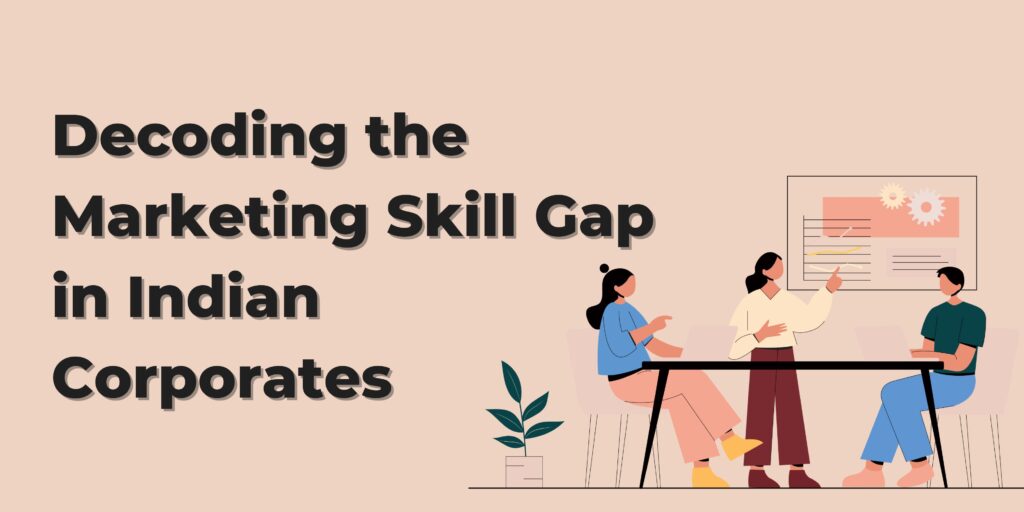Decoding the Marketing Skill Gap in Indian Corporates
The digital revolution has reshaped how businesses in India operate, communicate, and grow. From e-commerce to fintech, every sector is increasingly dependent on digital channels to reach customers and drive sales. Yet, a persistent challenge stands in the way of maximizing this opportunity—the marketing skill gap within corporate teams.
While organizations are investing heavily in digital infrastructure, advertising, and marketing tools, many are discovering that their in-house talent is not fully prepared to keep pace. This blog explores the nature of this skill gap, why it exists, and how Indian corporates can address it.
The Reality of the Skill Gap
Most corporates in India are well aware of the need for digital marketing. They allocate significant budgets to online advertising, social media, and marketing automation platforms. However, when it comes to execution, many rely heavily on external agencies.
This over-reliance is not always by choice—it often stems from gaps in knowledge, practical skills, and confidence among in-house teams. The result is a lack of autonomy and an inability to build sustainable, long-term digital strategies.
Areas Where the Gaps Are Most Visible
1. Performance Marketing
Running ads on Google, Meta, or LinkedIn is not difficult. But structuring campaigns, splitting budgets between prospecting and retargeting, and optimizing for ROI require advanced skills. Many teams lack this depth, leading to inefficiencies.
2. Analytics & Measurement
Digital platforms provide rich data, yet turning numbers into insights is a challenge. Teams often track surface-level metrics but struggle to connect campaign performance with business outcomes.
3. Content & Creativity
Digital marketing thrives on engaging content. Still, many corporates struggle to adapt strategies for different platforms or leverage user-generated content effectively.
4. SEO & Organic Growth
While paid campaigns get attention, organic marketing often remains underdeveloped. Teams tend to overlook technical SEO, long-form content, and inbound strategies that build sustainable traffic.
5. Technology & Automation
Corporates may invest in CRMs, automation tools, and AI platforms, but without skilled professionals to operate them, these tools are underutilized.
Why Does This Gap Exist?
Several factors explain why this gap persists in Indian corporates:
- Fast-Changing Landscape – Platforms and algorithms evolve quickly, making it hard for teams to stay updated.
- Outdated Education – Traditional marketing education rarely covers advanced digital practices.
- Agency Dependence – Over time, reliance on external agencies has limited the opportunity for in-house capability building.
- Lack of Structured Upskilling – Training investments often focus on tools, not on strategy and integration.
Consequences of Not Addressing the Gap
Ignoring the marketing skill gap can be costly. Companies risk wasting budgets on poorly optimized campaigns, losing visibility to competitors, and relying too much on third parties. It also reduces agility—teams cannot respond quickly to market shifts or consumer behavior changes.
Ultimately, a weak internal skill base affects growth, innovation, and competitiveness in the digital economy.
Bridging the Gap: The Way Forward
The solution lies in a more deliberate approach to capability building. Corporates can take several steps:
1. Skill Assessments
Conduct periodic evaluations of team skills to identify strengths and areas of improvement.
2. Customized Training Programs
Invest in upskilling initiatives that are aligned with business goals and industry needs, rather than generic workshops.
3. Blended Learning
Combine practical project-based learning with consulting support, so teams can immediately apply new knowledge to real campaigns.
4. Culture of Continuous Learning
Encourage employees to stay updated through certifications, industry webinars, and internal knowledge-sharing sessions.
The marketing skill gap in Indian corporates is not a minor hurdle—it is a structural challenge that can directly impact competitiveness and profitability. While technology, tools, and budgets are important, the real differentiator will be talent.
By investing in structured skill development, empowering in-house teams, and fostering a culture of continuous learning, corporates can future-proof their marketing functions and thrive in the digital-first economy.



